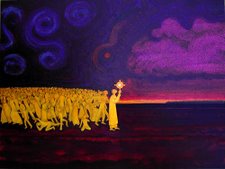
FROM AFTERTHEFUTURE
...If there is one overarching emotion that characterizes Romanticism, it's nostalgia. The Romantic poets from Blake to Wordsworth hate modernity and long for something lost, a lost age (or a lost childhood) when one did not feel so estranged, when men were men and women were women, where nobility and grace and chivlary were the rule, where the world was full of mystery and enchantments that the Romantic feels as a kind of memory but no longer possesses....
...I think that this important to understand because for the kind of romantic reactionary Buckley was, American liberalism was just a watered-down version of Marxism. The spirit of modern liberalism was the same as the spirit of communism-- its materialism, its naive optimism, its rejection of tradition and religion, its rational mechanistic solutions to social problems, its top-downism, its Jacobin hubris. His life's purpose was to wage war against the mindset that characterized secular liberalism which for him was a disease that eviscerated the soul and made humans into gutless, dependent, children--"men without chests," as C.S. Lewis described moderns in his Abolition of Man. This is important to understand if you're to understand the animus of Buckley's kind of conservatism against what for most sensible people seems the benign common sense of liberal welfarism. For such romantics Liberal programs are not common-sense solutions to practical social problems; they are the emanations of a spiritually crippling social disease.
And so for all of his elan, Buckley in the end was an irrelevancy. It's the problem of all reactionaries who refuse modernity rather than embrace it in order to live through it. I would contrast him with another kind of traditionalism--the kind, for instance, that the radical social critic Ivan Illich represents. Illich was a Catholic priest with deep family roots in old Europe. Anybody who knows his work knows that for him tradition was not something into which he retreated nostalgically, but was the source for his radical and energetic critique and imagination of solutions. From Cayley's Conversations with Ivan Illich:
Illich has often drawn attention to how traditional his views are and to how novel such views can seem in the context of contemporary cultural amnesia. As early as 1959 he introduced an essay called "The Vanishing Clergyman" by saying that he was not writing "anything theologically new, daring, or controversial." "Only spelling out of social consequences," he went on, "can make a thesis as orthodox as mine sufficiently controversial to be discussed." In these pages, he remarks that today "it's very difficult to speak about . . . things which seem to have been obvious and unquestioned during a thousand years of Western tradition." " I often have the impression, he says, "that the more traditionally I speak, the more radically alien I become."
No kidding. Anybody who has been reading this blog over time knows that I am sympathetic with the conservative critique of modernity while at the same time refusing conservative solutions for the problems of modernity. So I understand where Buckley is coming from, but I completely reject his politics and his imagination for a cure. People like Illich are fecund with future possibility, while Buckley's vision in the end is barren.
I wonder if Illich ever appeared on "Firing Line". That would have been a very interesting conversation.



2 comments:
Yes the NR has become a grotesque hitching pole for all the fossilised know nothing reactionaries of the USA and elsewhere.
It champions everything that is wrong with USA "culture".
From the double-minded sex paranoid puritanism of conventional religiosity.
To being a belligerent loud-mouthed champion of the military-industrial-"entertainment" complex and its "culture" of death which now permeates every aspect of USA "culture".
While at the same time pretending to be the guardian and promoter of "higher" transcendental values and/or wisdom.
By the way I dont think William Blake was a "romantic reactionary" at all.
It seems to me that his understanding was informed by a genuine transcendental vision or in-sight into the formative energies of existence-being. The same (integral)vision that informed all of the genuine English Divines---Thomas Traherne for instance.
The same integral vision or in-sight that informed(informs) the Perennial Philosophy/Tradition altogether.
Plus he had some genuinely prophetic insights into the inevitable outcome(s) of a "culture" formed in the one dimensional reductionist (anti)-vision of Newton's sleep.
The so called "culture" that all the benighted ghouls at the NR now loudly champion.
Post a Comment